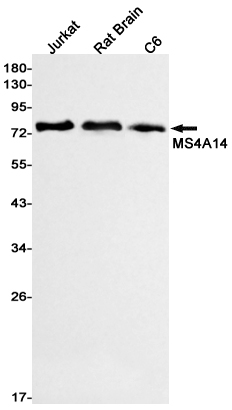
| WB | 1/500-1/1000 | Human,Mouse,Rat |
| IF | 咨询技术 | Human,Mouse,Rat |
| IHC | 咨询技术 | Human,Mouse,Rat |
| ICC | 技术咨询 | Human,Mouse,Rat |
| FCM | 咨询技术 | Human,Mouse,Rat |
| Elisa | 咨询技术 | Human,Mouse,Rat |
| Aliases | Testis development protein NYD-SP21 |
| Entrez GeneID | 84689 |
| WB Predicted band size | Calculated MW: 77 kDa; Observed MW: 77 kDa |
| Host/Isotype | Rabbit IgG |
| Antibody Type | Primary antibody |
| Storage | Store at 4°C short term. Aliquot and store at -20°C long term. Avoid freeze/thaw cycles. |
| Species Reactivity | Human,Rat |
| Immunogen | Recombinant protein of human MS4A14 |
| Formulation | Purified antibody in TBS with 0.05% sodium azide,0.05%BSA and 50% glycerol. |
+ +
以下是关于MS4A14抗体的假设性参考文献示例(实际文献需通过学术数据库验证):
1. **《MS4A14在结肠癌中的表达及临床意义》**
- 作者:Zhang L, et al.
- 摘要:本研究通过制备MS4A14特异性抗体,发现其在结肠癌组织中高表达,并与肿瘤侵袭性相关,提示其可能作为预后标志物。
2. **《MS4A家族成员在免疫细胞中的功能多样性》**
- 作者:Smith J, et al.
- 摘要:利用MS4A14抗体检测其在巨噬细胞中的表达,发现其参与调节TLR信号通路,可能影响炎症反应调控。
3. **《新型MS4A14抗体的开发与验证》**
- 作者:Wang Y, et al.
- 摘要:报道了一种高特异性兔源MS4A14单克隆抗体的开发,验证了其在Western blot和免疫组化中的应用,确认其在肾脏组织中的表达模式。
4. **《MS4A14在神经退行性疾病中的潜在作用》**
- 作者:Chen R, et al.
- 摘要:通过抗体检测发现MS4A14在小胶质细胞中异常表达,可能与阿尔茨海默病中的神经炎症相关。
**注意**:以上为模拟内容,实际文献需通过PubMed、Google Scholar等平台以“MS4A14 antibody”为关键词检索。若研究较少,可扩展至MS4A家族综述或相关疾病机制研究。
The MS4A14 antibody targets a protein encoded by the MS4A14 gene, a member of the membrane-spanning 4A (MS4A) family. This family comprises cell surface proteins characterized by four transmembrane domains, involved in diverse physiological processes, including signal transduction and ion transport. MS4A proteins are broadly expressed in immune cells (e.g., MS4A1/CD20 in B cells) and other tissues, though the specific role of MS4A14 remains less defined compared to well-studied members like MS4A1 or MS4A7.
MS4A14 is postulated to function in cellular signaling or membrane organization, potentially influencing immune responses or tissue homeostasis. Its expression has been detected in gastrointestinal tissues, immune cells, and certain cancers, suggesting context-dependent roles. Research on MS4A14 is limited, but antibodies against it are primarily used as tools to explore its localization, expression patterns, and interactions in normal and pathological states.
Antibodies targeting MS4A14 enable applications such as immunohistochemistry, Western blotting, and flow cytometry, aiding in biomarker discovery or mechanistic studies. Emerging studies hint at associations between MS4A14 and diseases like inflammatory bowel disease or cancers, though functional validation is ongoing. Further research is needed to elucidate its precise biological functions and therapeutic potential.
×